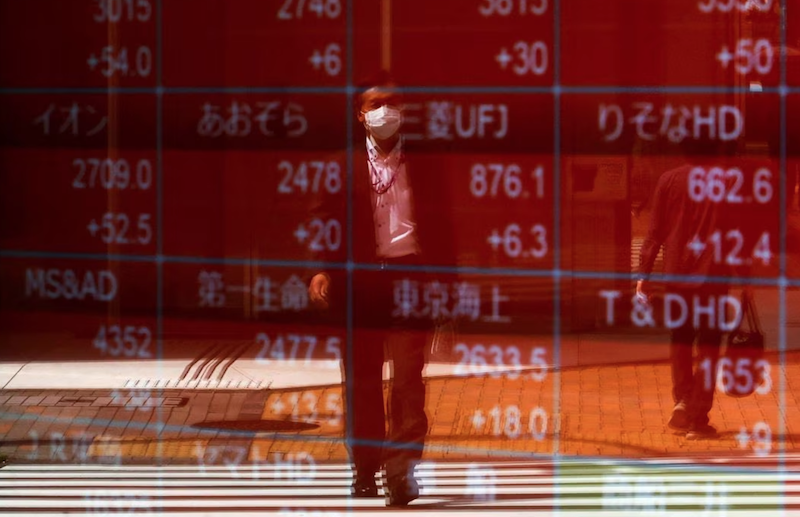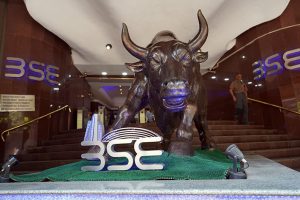Asia’s major stock indexes saw a mixed start to the week with investors across the region pulled in different directions by US interest rate bets, China’s woes and Beijing’s latest stimulus efforts.
But the shining outlier continued to be Japan’s Nikkei share average which crossed the 36,000 mark for the first time in 34 years, powered by shippers and financials, with a retreat in US bond yields and a stabilisation in the yen exchange rate buoying sentiment.
The Nikkei finished the day 0.91% higher at 35,901.73, after touching the highest since February 1990 at 36,008.23. The broader Topix, which is less weighted towards technology shares than the Nikkei, rose 1.22% on the day and also touched a new 34-year high during the session.
The continued gains for Japanese stocks come despite signs of overheating. One closely watched technical indicator called the relative strength index, or RSI, climbed to 76.41 for the Nikkei, with readings above 70 signalling “overbought” conditions.
Also on AF: China’s Military, AI Bodies Still Buying Nvidia Chips Despite US Ban
China stocks and bonds struggled for direction after the central bank surprised markets by leaving the interest rate unchanged when rolling over maturing medium-term policy loans.
The People’s Bank of China (PBOC) instead boosted liquidity injections in the operation. It kept the rate of medium-term lending facility (MLF) loans unchanged at 2.50%, but injected a net 216 billion yuan of fresh funds into the banking system.
Meanwhile. new bank lending in China rose less than expected in December from the previous month, but lending for the full year of 2023 set a record as the central bank keeps policy accommodative.
China’s CSI 300 index was down 0.10% on the day, while the Shanghai Composite Index rose 0.15%, or 4.31 points, to 2,886.29. The Shenzhen Composite Index on China’s second exchange fell 0.33%, or 5.84 points, to 1,743.58.
Hong Kong-listed tech giants declined 1.8% and the Hang Seng Index edged back 0.17%, or 28.25 points, to 16,216.33.
Elsewhere across the region, in earlier trade, Taipei rose after pro-sovereignty candidate Lai Ching-te won Taiwan’s presidential election, but his Democratic Progressive Party (DPP) lost its majority in the legislature.
There were also gains in Seoul, Mumbai, Singapore, Manila and Bangkok but Sydney, Jakarta and Wellington fell. MSCI’s broadest index of Asia-Pacific shares outside Japan dipped 0.21%, after losing 0.8% last week.
S&P 500 futures and Nasdaq futures were both flat. Eurostoxx 50 futures added 0.4% and FTSE futures 0.2%.
Earnings season rolls on this week, with Goldman Sachs and Morgan Stanley among those reporting. Retail sales is the main US data of the week, while the Iowa caucus will be run in frigid weather later on Monday.
Davos Forum Meets
The Davos World Economic Forum runs to Friday and is notably packed with European Central Bank speakers, including President Christine Lagarde.
Over the weekend, ECB chief economist Philip Lane said there would have been enough data by June to decide on the first of a likely series of interest rate cuts.
Markets are fully priced for an easing in April and imply a whopping 154 basis points of cuts over 2024.
That dovish outlook has limited the euro’s gains on the dollar and it was idling at $1.0956 on Monday, having barely budged last week.
The dollar has fared somewhat better on the yen, as a run of subdued Japanese data gave the Bank of Japan reason to stick with its uber-easy policies. The dollar edged up further to 145.18 yen, and toward last week’s top of 146.41.
The prospect of lower rates globally was underpinning non-yielding gold at $2,054 an ounce, following a 1% jump on Friday.
Oil prices had got some lift from disruptions to shipping in the Red Sea, though worries about demand this year have limited the rally. Brent added 15 cents to $78.44 a barrel, while US crude rose 7 cents to $72.75 per barrel.
Key figures
Tokyo – Nikkei 225 > UP 0.91% at 35,901.79 (close)
Hong Kong – Hang Seng Index < DOWN 0.17% at 16,216.33 (close)
Shanghai – Composite > UP 0.15% at 2,886.29 (close)
London – FTSE 100 < DOWN 0.04% at 7,621.92 (0935 GMT)
New York – Dow < DOWN 0.31% at 37,592.98 (Friday close)
- Reuters with additional editing by Sean O’Meara
Read more:
China Bank Lending at Record High But Recovery Still Elusive
US Bitcoin ETFs Turn Over $4.6 Billion on First Day of Trading
China’s Deflation And Weak Economy Point to Another Bumpy Year
Nikkei’s Record Surge Sparks Overheating Fears, Hang Seng Dips























